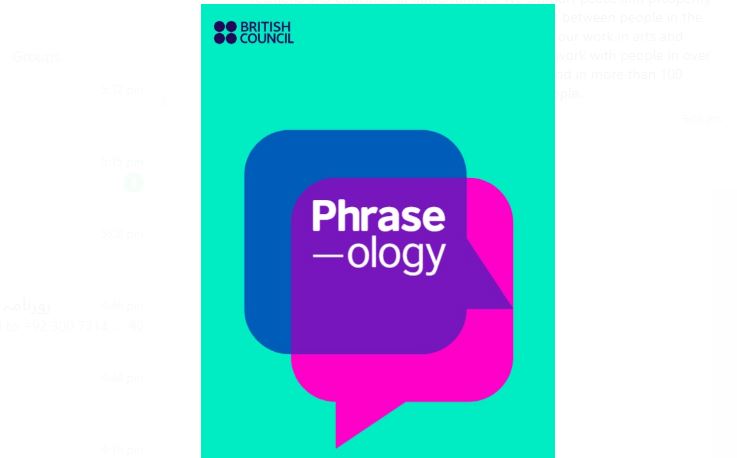The British Council has launched a collection of 100 idioms, proverbs and phrases
that shed light on the evolution of English.
23rd April 2025: To mark World English Day, the British Council has unveiled Phrase-ology — a major new research project exploring the fascinating journey of English expressions, from ancient origins to modern slang shaped by global cultures and digital life.
Led by Dr. Barbara McGillivray, expert in computational linguistics, and NLP specialist Iacopo Ghinassi, the study analysed millions of online texts to track the emergence, evolution, and popularity of phrases. From long-established idioms like “breaking the ice” to new-gen slang such as “ate and left no crumbs” (meaning to do something flawlessly), the research shows how English continues to evolve and adapt.
James Hampson, Country Director, British Council Pakistan said: “As we trace the journey of English through time and culture, we’re also recognising its power to open doors and build bridges within Pakistan and around the world.”
Mark Walker, Director of English & Exams at the British Council, said: “By celebrating the richness of our language, we’re not just looking at its past, but also at the future of English. Whether for work, study, travel, relationships, or lifelong learning, as the global lingua franca, English is one of the key ways that people connect and engage across cultures.”
From Ancient Greece to Gen Z: A Language in Motion
Phrase-ology reveals that while time-honoured phrases like “kill two birds with one stone” are still common, others have been reinvented or emerged in recent decades. For example, “spill the beans” dates to the early 1900s, but its modern cousin “spill the tea” – popularised within African American and other communities – surged on social media from 2017 onwards.
Even expressions like “bucket list”, now widely known, barely existed in popular usage before the 2007 film of the same name. Meanwhile, phrases like “let them cook” and “main character energy” highlight how social media continues to generate and amplify new linguistic trends.
Language Across Generations
The study also highlights generational differences and overlaps. While older phrases like “better late than never” remain widely used, Gen Z has embraced terms such as “glow up”, “no cap”, and “vibe check”. Yet, some expressions like “keep it real”, first heard in the 1960s, remain relevant across all age groups.
A Global Language with Global Roots
English expressions often have unexpected international origins. “Long time no see” may derive from Chinese Pidgin English or early 20th-century American Westerns. “Moment of truth” comes from the Spanish bullfighting term “hora de la verdad”, while “chin chin” – now a toast – stems from the Chinese word “qǐng”, meaning “please.” The study even draws linguistic parallels, such as Nigeria’s “to yarn dust” – similar in meaning to “talking rubbish.”
A Living Language, Categorised
The British Council has compiled a list of 100 phrases that reflect the richness of English, organised into eight thematic categories:
• Global English – borrowed from other languages (e.g. let the genie out of the bottle)
• Classic Evergreen – longstanding idioms (e.g. raining cats and dogs)
• Generational – tied to specific eras (e.g. instant karma)
• Pop Culture – driven by media and entertainment (e.g. let them cook)
• Sports – with athletic origins (e.g. straight off the bat)
• Gen Z – contemporary slang (e.g. no cap)
• Language of Belief – rooted in religion (e.g. turn the other cheek)
• Shakespeare – phrases from or inspired by his works (e.g. wearing one’s heart on one’s sleeve)
Phrase-ology is a reminder that English isn’t just a language we use — it’s a living, evolving reflection of who we are, how we connect, and the world we share








